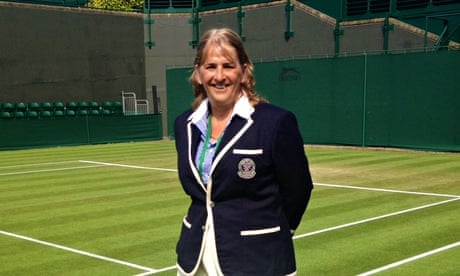Sometimes you can come off court and someone will ask what the score was and you'll have no idea. I'll be in the zone, concentrating on my line, and then suddenly it's match point and you think 'Oh, what just happened?'" says Bernadette Halton, one of the umpires at Wimbledon.
The long-standing umpire of both line and chair doesn't know a time where she hasn't taken several weeks off a year to "give back to tennis". Since the age of 12, Halton, 55, who now lives in Redditch, circuited the north London tennis club tournaments as a member of the Coolhurst Club, where umpiring each other's games was encouraged. "We used to have competitions on who could umpire the most matches. I'm very competitive and thought I'm going to win this."
She's been part of Wimbledon since 1985 and remains as committed to the sport as ever. Over time the on-court protocols have become stricter: "We have to walk on in a line with our jackets on with the middle button done up. On the show courts we can't bring our handbags. When it gets very hot we carry our jackets on our left arm with our badge showing."

"You'll never see the ball kids step out of line or really talk to each other, they're not supposed to," Halton says. As an umpire she is under strict instruction to wear her jacket for photographs.
To become an umpire you need a strong set of lungs.
"Someone asked me what I shout out when the ball goes over the line. I thought what a stupid question, I say OUT! But then I realised it's because it doesn't sound like the word at all, but more like a sharp grunt."
There are two branches of umpiring: chair and line. You can apply through the Lawn Tennis Association and sign up to be an official. You'll be invited to an assessment day to see if you've got the right qualities – eye sight, voice and concentration, followed by an accreditation course in the basic rules of tennis with a written examination at the end. This part takes no longer than a few weeks but the essential part is getting through a string of tournaments for the practical experience necessary before the likes of Wimbledon.
You are regularly watched and monitored across the tournaments. You are given a mark out of seven on your calling accuracy and how strong your alert position is.
After sufficient experience you'll be graded as an L4 (line umpire), which gives you the grounding to become a U3 (chair umpire).
"From a line umpire perspective you go up from an L4 to a L3 to an L2, L1 (top line judge) to get from a 4 to a 1 you have to go through an advance course- but you can just as easily go down as quickly as you got up. Depending on your performance you need to get the best scores out of seven, which are then put against your record and then at the end of the year we have a grading committee, which I sit on and we look at everybody's performance," Halton says.
To become an umpire you don't need to have ever held a racket. "Some of the best umpires have never played before. If you're assertive and make bold, confident decisions the players will feed off that."
You have to complete a minimum of 30 days a year of umpiring. It's unlikely but not impossible that you could be at Wimbledon two years down the line, assuming you achieve the best possible record.
Most umpires volunteer. Halton is an area fundraising manager for Macmillan Cancer Support. Holiday time is a sacrifice.
The fiscal return comes in the feel good factor but there is the potential for a career. It is possible to be a full time chair umpire and travel around the world to the Grand Slams but the salaries vary from contract to contract. There are currently fewer than 10 professional chair umpires in the world hired by the International Tennis Federation.
"If you're very good, you'll be spotted and tracked to make sure those with potential can be the best." Otherwise umpires in Britain will receive a few expenses for the Championships.
Life on court can be very conspicuous with the world's gaze upon you but you're not there to be the centre of attention, she adds.
Halton knows a fair few languages, but her lexical field is limited to profanities. "We are given a list of all the swear words in different languages – if I hear an expletive in French or Russian, that's a code breach."
The code goes as far as protecting inanimate objects. If a player throws a racket, that's racket abuse.
The pressure has pushed Halton to jump the gun on occasion. "Years ago it was a men's final and I was watching the service line and saw the ball go down and I shouted fault and I thought 'Oh no! That was a tiny puff of chalk,' and it actually hit the line and I called too soon. In that moment you just want the world to swallow you up."
In an event of a miscalculated decision, you shout correction and raise your arm.
In the chair, Halton has been on the receiving end of angry tirades from players. "Once a player was so angry with me he told me to go home and wash the dishes. It's probably because I gave him a code for his unsportsmanlike conduct for throwing his racket around."





Comments (…)
Sign in or create your Guardian account to join the discussion